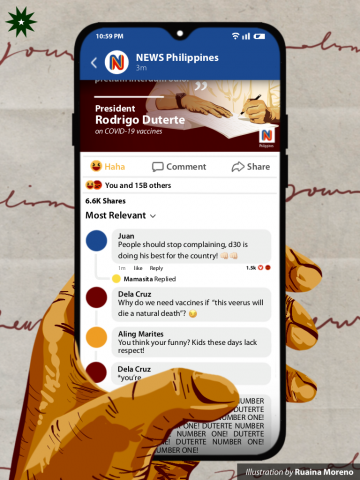
To shed light on the significance of journalism and current issues during the pandemic, Pia Ranada-Robles, a multimedia palace reporter from Rappler, and Malou Talosig-Bartolome, a former reporter and senior news editor of GMA News, shared their expertise in Mulat: Journalism Amidst the Pandemic, a webinar organized by Alyansang Tapat sa Lasallista last April 15 on Zoom.
Demystifying online disinformation
The age of digital media has made information accessible with just a click of a button. However, the rise of these online platforms has also enabled the vast spread of disinformation, which Ranada said has had a profound impact on the jobs of journalists.
“A lot of times fake news is viral because fake news, or ‘yung disinformation, tend to latch onto your emotions, to very extreme emotions like anger, paranoia, [and] fear,” the reporter elaborated. “It’s so easy for someone to come up out of thin air with fake news, whereas really accurate investigative journalism…could take days, could take months and cost money.”
She also differentiated between disinformation and misinformation, stressing that the former involves the “deliberate deception” of readers, while the latter is an “honest mistake” made by writers who unintentionally publish inaccurate reports.
Meanwhile, Talosig-Bartolome emphasized the importance of reliable media sources in digital journalism as social media banter and disinformation can distract the audience from relevant news topics. “Kaya nga importante ang media kasi kami ‘yung dapat na nagsasabi na ito dapat ‘yung pansinin niyo,” she stated.
(That is why the media is so important because we inform you of what news you need to pay attention to.)
With various news items regarding the pandemic circulating online, Ranada stressed how fact-checking plays a part in ensuring people receive factual information and should be an essential practice within the media industry.
“It’s about embedding fact-checking in the reporting process itself,” she summarized, citing Rappler’s fact-checking unit wherein readers can have claims or posts on social media verified by their team. “Apart from having like a fact-checking unit, dapat lahat ng reporters…in-built na sa’yo ‘yung i-fact-check ‘yung sinasabi ng opisyal.”
(All reporters should innately fact-check statements from officials.)
On censorship, free speech
One of the obstacles that journalists face is media censorship, especially from the government, who sometimes prevent them from releasing vital information, leaving the public unaware of the situation on hand.
Ranada said that it was “very obvious” that ABS-CBN’s shutdown was driven by threats directly from President Rodrigo Duterte. “If you looked at the issues taken up during the house hearings on the ABS-CBN franchise, ‘di ba the lawmakers kept airing concerns about unfair coverage?” she recalled. “Those issues could’ve been threshed outside of the debate of the franchise kasi lahat naman ng mga media outlets na may ganon pitfalls…There are avenues to air out those grievances in a way that won’t lead to the shutdown of an entire network.”
She believes that the harm had “outweighed the benefits or sense of justice that the government pretended to be running after,” pointing out that over 11,000 workers lost their jobs and that people in different provinces lost access to information that was once provided by ABS-CBN’s regional networks.
On the topic of freedom of speech and red-tagging, Ranada argued that threats from the government have made people afraid to speak up, citing attacks against media companies like Rappler and ABS-CBN, as well as the passing of the Anti-Terrorism Law.
“I think the best way to combat right now is to support journalists because this is actually our job—to tell the truth,” she added. “The work that we do also informs you and helps you be more aware of concerns that may affect your life. Without proper reporting in journalism, you won’t have information to assess where you are in life.”
Talosig-Bartolome, meanwhile, shared what she believes is the media’s role in society, “Checks and balances are important because absolute power corrupts; that’s human frailty. Kaya important ang media for checks and balances.”
